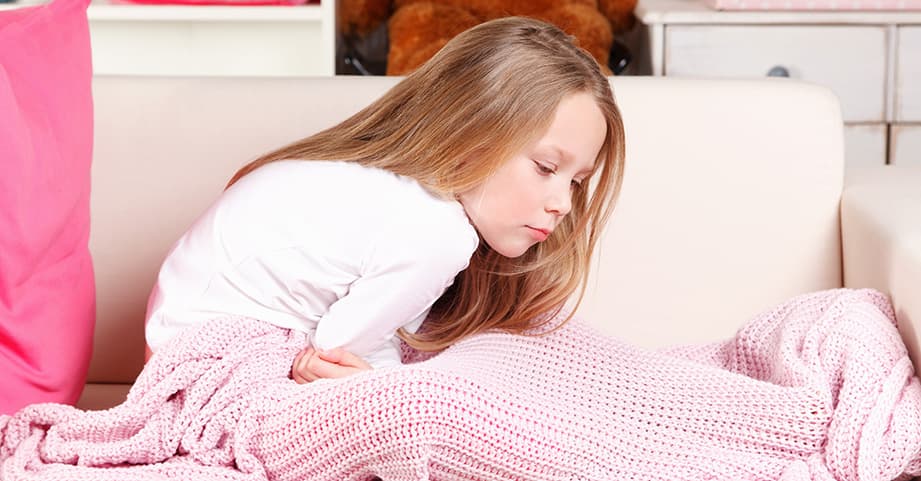Urinary Tract Infections
Updated 9/5/23
Urinary tract infections (UTIs) are common in children, especially girls. This guide will help you understand how a UTI occurs, what are the most common symptoms of this infection and how you can help ensure it’s treated effectively.
UTIs occur when bacteria find its way into the urinary tract. The urinary tract, or system, consists of the kidneys, the ureters (which connect the kidneys to the bladder), the bladder and the urethra.

“UTIs typically occur in the lower part of the urinary tract, either in the bladder or urethra,” says Deirdre Stewart, MD, pediatric urgent care physician. “But sometimes the infection can travel up to the kidneys and result in a more serious infection.”
UTIs are common in kids. The exact numbers vary depending on age and gender, but around eight out of 100 girls and two out of 100 boys will get a UTI, according to the Urology Care Foundation.
Girls are at higher risk simply because of their anatomy. Their urethra is shorter, so bacteria have less road to travel to find a home in the bladder. It’s also closer to the rectum, which means stool—and the bacteria it contains—is close by.
Boys under the age of 1 who are uncircumcised are also at a slightly higher risk for UTIs. Parents should take extra care to clean around the urethra to prevent bacteria buildup.
What causes UTIs in children?
The most common causes of UTIs in kids include:
Infrequent diaper changes
The longer stool is in close proximity to the urethral opening, the higher the chances of bacteria spreading into the urinary tract. “For infants and toddlers, parents and caregivers need to remember to change diapers often,” advises Dr. Stewart.
Poor wiping habits
Kids who are potty-trained may rush during wiping and track bacteria from their bottom to the urethra. “Once kids are potty-trained, make sure girls especially learn to wipe from front to rear,” says Dr. Stewart.
Delaying urination
Urination helps flush the urinary tract of any bacteria present, so holding it in fosters germ buildup. “It’s common for kids to delay going to the bathroom, especially at school or at play, so remind them to take a break and use the potty as soon as they feel the need to go,” says Dr. Stewart.
Not staying hydrated
Drinking fluids helps dilute the urine and makes you urinate more often, both of which can help prevent UTIs. Water is best. Dr. Stewart advises avoiding caffeine, as it can irritate the bladder.
Sexual activity
If you have older teens who are sexually active, particularly teen girls, talk to them about UTI prevention strategies. Urinating after sex can help eliminate bacteria from the urinary tract. Cleaning the genital area prior to sex can also reduce the risk of bacteria entering the urethra.
Abnormalities of the urinary tract
Children are more likely than adults to have undiagnosed abnormalities of the urinary tract that put them at higher risk for UTIs. These might include: vesicoureteral reflux, which causes urine to flow backward; uretal duplication, when there are two ureters draining the kidney; urinary tract obstruction; and bladder dysfunction. “When kids have frequent UTIs, doctors will evaluate them for these structural abnormalities,” says Dr. Stewart.
A UTI may not be the first thing that comes to mind when your child is sick, especially if they are young and can’t tell you how they’re feeling. Here are some of the most common signs to look out for that may indicate that your baby or child has a UTI.
Symptoms of a UTI in babies:
- Fever
- Fussiness
- Poor feeding or appetite
- Vomiting
- Strong smelling urine
Symptoms of a UTI in children:
- Fever
- Painful urination
- Frequent voiding with limited output
- Resisting urination
- Wetting accidents
- Blood in urine
How are UTIs in children diagnosed?
If your child has any persistent symptoms of a UTI, it’s important to see your pediatrician. They will examine your child and, if they suspect a UTI, they will request a urine sample.
For older kids, collecting a urine sample involves wiping the genital area with a sterile wipe and collecting urine in a cup. For babies, urine collection may require doctors to either collect urine in a bag for a quick screening to rule out infection (used in babies over 6 months). For younger babies or to confirm a UTI diagnosis, the doctor may insert a temporary catheter to obtain a urine sample.
Testing the urine is the only way to diagnose a UTI. Your pediatrician's office will do a urinalysis first, which can typically be done on site. “This is a screening during which we look for certain abnormalities in the urine that are caused by bacteria,” says Dr. Stewart.
If the urinalysis is positive for abnormalities, the next step is a urine culture. This test is done in a lab that grows the bacteria found in the urine and tests it to identify the type of bacteria present. This culture can take 3-5 days to complete. It not only confirms a UTI diagnosis, but can also help doctors determine the best medicines to treat the infection effectively.
“If a child is symptomatic and uncomfortable and the urinalysis shows signs of a UTI, we will go ahead and treat them while we are waiting for confirmation from the urine culture,” says Dr. Stewart. “Based on the results from the culture, we may stop antibiotics or switch them depending on the bacteria present.”
The only way to treat a urinary tract infection is with antibiotics. It’s important for parents to give kids the prescribed dose and complete the entire course of treatment to help ensure bacteria is eliminated completely. Occasionally, doctors may request a follow-up urinalysis to make sure treatment was effective.
Caring for a child with a UTI
Medication is the only way to cure a UTI, and kids typically feel better quickly. But there are steps parents can take at home to help make kids more comfortable until symptoms subside.
These include:
- Fever-reducing medication
- Rest
- Lots of fluids
- Frequent urination
- Heating pad applied to the back or stomach
Even though you may have had success with over-the-counter UTI pain relief, Dr. Stewart advises not to give these to kids. “We don’t want to delay the diagnosis of a UTI, and some of those products can interfere with the results of the urinalysis,” she says.
Is cranberry juice good for a UTI?
Contrary to what you may have heard, cranberry juice is not a cure for UTIs. According to the National Kidney Foundation, cranberries may be beneficial for preventing UTIs because they contain a compound that can help keep bacteria from hanging out in the urinary tract. But studies are still ongoing to prove their effectiveness. If your child likes cranberry juice, then it can’t hurt to add it to their diet. Just make sure it’s 100% juice and not the super sweet cocktail.
Risks of not treating a UTI
A urinary tract infection can lead to serious complications if left untreated. Some of these include:
- Kidney abscess or buildup of infected fluid around the kidneys
- Reduced kidney function
- Renal scarring and hypertension (high blood pressure)
- Urosepsis or infection that enters the bloodstream
The bottom line: UTIs aren’t something that will go away on their own. If your child is showing any signs of a urinary infection, make an appointment with your pediatrician as soon as possible or visit an urgent care.

At Children's, we’re more than a healthcare provider; we’re a support system for families all across Georgia. Our pediatric experts are here for you with resources, information, and services to help you be the best parent you can be.
More ResourcesDeirdre Stewart, MD, is an area practice director for Children’s Healthcare of Atlanta Urgent Care. She has been working in Urgent Care at Children’s since November 1999. Dr. Stewart maintains an undergraduate degree from Emory University, Medical School at Medical College of Georgia, and pediatric residency at Emory. She is board certified in PediAttica and a member of the AAP and Society for Pediatric Urgent Care.
This content is general information and is not specific medical advice. Always consult with a doctor or healthcare provider if you have any questions or concerns about the health of a child. In case of an urgent concern or emergency, call 911 or go to the nearest emergency department right away. Some physicians and affiliated healthcare professionals on the Children’s Healthcare of Atlanta team are independent providers and are not our employees.
Contact Us 404-785-KIDS (5437)